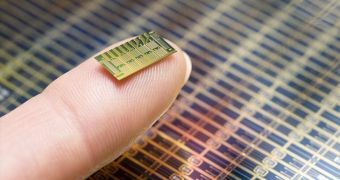A company based in the town of Lexington in Massachusetts, US, is now looking to obtain the Food and Drug Administration's approval to roll out clinical trials meant to test the efficiency of a chip intended for birth control in human patients.
The chip in question was developed by researchers working with this company, which goes by the name MicroCHIPS, and has until now only been used to administer osteoporosis medication to post-menopausal women.
Information shared with the public says that, during this clinical trial, it performed surprisingly well. What's more, its use was not linked to any serious side effects that might put the reliability of this technology into question.
Hence, scientists with said company are now looking into the possibility to have the microchip replace the more traditional contraceptive methods that are currently available on global markets, C Net informs.
The microchip, a photo of which is available above, is implantable, meaning that, in order for it to work, it need only be inserted under a patient's skin. The procedure is safe, and can be completed in under 30 minutes, the same source explains.
Because of its small size, i.e. it only measures 20 x 20 x 7 millimeters (roughly 0.78 x 0.78 x 0.27 inches), the chip is argued to cause no inconvenience whatsoever to the person wearing it. What's more, its creators say that it has a lifespan of 16 years.
The chip is designed in such ways that, when used for contraception, it can deliver 30 milligrams of levonorgestrel, a compound that is commonly used to prevent pregnancy, on a daily basis until it reaches the end of its life and has to be replaced with a new one.
According to MichoCHIPS, the levonogestrel is stored inside a special reservoir inside the chip. This reservoir can be controlled with the help of a remote, meaning that, should a woman fitted with the chip decide that she does want to become pregnant, she need only switch the chip off for a while.
“Individual device reservoirs can be opened on demand or on a predetermined schedule to precisely control drug release or sensor activation,” the Lexington, Massachusetts-based company behind this technology explains.
MicroCHIPS expects that, should things go as planned, the Food and Drug Administration will give it permission to test the use of this chip for birth control sometime next year. Provided that all goes well during clinical trials, the chip should hit markets by 2018.

 14 DAY TRIAL //
14 DAY TRIAL //